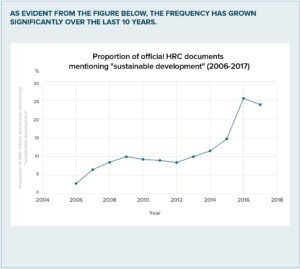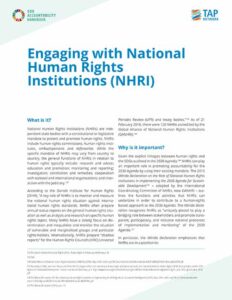Engaging with National Human Rights Institutions (NHRIs)
What is it?
National Human Rights Institutions (NHRIs) are independent state bodies with a constitutional or legislative mandate to protect and promote human rights. NHRIs include human rights commissions, human rights institutes, ombudspersons and defensorías. While the specific mandate of NHRIs may vary from country to country, the general functions of NHRIs in relation to human rights typically include: research and advice; education and promotion; monitoring and reporting; investigation; conciliation and remedies; cooperation with national and international organizations; and interaction with the judiciary.1
According to the Danish Institute for Human Rights (DIHR), “A key role of NHRIs is to monitor and measure the national human rights situation against international human rights standards. NHRIs often prepare annual status reports on the general human rights situation as well as analysis and research on specific human rights topics. Many NHRIs have a strong focus on discrimination and inequalities and monitor the situation of vulnerable and marginalised groups and particular rights-holders. Internationally, NHRIs prepare “shadow reports” for the Human Rights Council’s (HRC) Universal Periodic Review (UPR) and treaty bodies.”2 As of 21 February 2018, there were 120 NHRIs accredited by the Global Alliance of National Human Rights Institutions (GANHRI).3
Why is it important?
Given the explicit linkages between human rights and the SDGs outlined in the 2030 Agenda,4 NHRIs can play an important role in promoting accountability for the 2030 Agenda by using their existing mandate. The 2015 Mérida Declaration on the Role of National Human Rights Institutions in implementing the 2030 Agenda for Sustainable Development5 – adopted by the International Coordinating Committee of NHRIs, now GANHRI – outlines the functions and activities that NHRIs can undertake in order to contribute to a human-rights based approach to the 2030 Agenda. The Mérida Declaration recognizes NHRIs as “uniquely placed to play a bridging role between stakeholders and promote transparent, participatory, and inclusive national processes of implementation and monitoring” of the 2030 Agenda.6
In particular, the Mérida Declaration emphasizes that NHRIs are in a position to:
• Provide advice to national and local governments, rights-holders and others, to promote a human-rights based approach to implementing and measuring the 2030 Agenda, including by assessing the impact of laws, policies, programmes, national development plans, administrative practices and budgets;
• Promote transparent and inclusive processes for participation and consultation with rights-holders and civil society at all stages of implementation of the 2030 Agenda;
• Engage with all stakeholders to raise awareness, build trust and promote dialogue and concerted efforts for a human rights-based approach to SDG implementation and monitoring, and safeguard space for the engagement of rights-holders and civil society;
• Assist in shaping national indicators and data collection systems, including by building on existing international and regional human rights reporting and monitoring mechanisms;
• Monitor progress at all levels to identify inequality and discrimination, including through innovative and participatory approaches to data-collection and monitoring;
• Engage with, and hold governments to account for poor or uneven progress in implementation, including by reporting on SDG progress and obstacles to parliaments, the general public, and national, regional and international mechanisms;
• Respond to, conduct inquiries into, and investigate allegations of rights violations in the context of development and SDG implementation; and
• Facilitate access to justice, redress and remedy for those who experience abuse and violation of their rights in the process of development, including by receiving and processing complaints, where NHRIs have such functions.7
While NHRIs have the potential to promote accountability for the SDGs, some NHRIs may face constraints due to their restricted or limited mandates, lack of independence, limited technical capacity, and/or inadequate financial and human resources.8 In response to these limitations, the UN General Assembly adopted a resolution in December 2015 underlining the importance of effective, independent and pluralistic NHRIs for sustainable development.9 In addition, the global indicator selected to monitor SDG target 16.a in the 2030 Agenda is the “existence of independent National Human Rights Institutions in compliance with the Paris Principles,”10 which are the international benchmarks against which NHRIs are accredited by GANHRI.
How can it be used?
The Paris Principles explicitly mandate NHRIs to work closely with civil society, promoting cooperation and coordination to enhance the protection and promotion of human rights. In line with the Mérida Declaration, there are a number of ways that CSOs can engage with NHRIs to promote accountability for the 2030 Agenda, including the following:
1. Determine whether the country has an accredited NHRI and review its status – As a starting point, CSOs should determine whether there is an accredited NHRI and review its status in terms of compliance with the Paris Principles.11 GANHRI classifies NHRIs as “A” (fully compliant), “B” (partially compliant) or “C” (non-compliant) with the Paris Principles.

2. Engage with NHRIs to:
a. Secure or safeguard space for civil society – As a prerequisite for accountability for the 2030 Agenda, NHRIs may be able to play a role in safeguarding space for civil society actors to engage in SDG implementation and review processes. Such a role will, of course, depend upon the NHRI’s independence and autonomy from the country’s government. CSOs concerned about a lack of safe space to engage with the SDGs should contact their respective NHRI to determine what kind of support, if any, can be provided.
b. Raise awareness of the SDGs – The Mérida Declaration recognizes the role of NHRIs in engaging with stakeholders to raise awareness of the implementation and review of the SDGs. Accordingly, CSOs should seek to determine what actions NHRIs are taking to raise awareness of the SDGs and explore potential partnerships with NHRIs. For example, while NHRIs may have greater resources to promote awareness of the SDGs, some CSOs may be in a better position to reach vulnerable or marginalized groups with awareness-raising messages or activities. [For more information on raising awareness of the 2030 Agenda, see chapter on awareness-raising.]
c. Ensure transparent, inclusive and participatory national review processes – NHRIs can play a critical role in ensuring that national review processes engage with citizens, including those who are the furthest behind. CSOs should urge NHRIs to act as an advisor and convener of national review processes and mechanisms – including in relation to Voluntary National Reviews (VNRs) – and ensure that all processes are inclusive, participatory and engage marginalized groups and communities.
d. Provide independent reports on a country’s human rights situation in relation to the SDGs – CSOs should urge NHRIs to use their mandate to report on the SDGs to both human rights bodies as well as at SDG-specific forums such as the UN High-level Political Forum on Sustainable Development (HLPF). NHRIs can provide information on the general human rights situation, unequal progress and the situation of those furthest behind, as well as information on procedural aspects of national consultations, including their transparency and stakeholder participation.12
e. Promote participatory approaches to data-collection and monitoring the SDGs – NHRIs can use their existing mandate to facilitate participatory data collection processes13 in order to identify inequalities that might otherwise be overlooked by official government data sources. Accordingly, CSOs should consider partnering with NHRIs on third-party data initiatives that engage vulnerable or marginalized groups that may be excluded from traditional data collection and monitoring methods. [See chapter on data.]
f. Conduct independent research and publish reports on SDG implementation – CSOs should encourage NHRIs to conduct independent research and publish reports that document and assess the impact of laws, policies, programmes, national development plans and budgets in relation to SDG implementation, especially for vulnerable or marginalized groups.14 Research and reports may be produced individually by NHRIs or jointly with CSOs in order to assess the contribution, or lack thereof, of governments as well as other development actors engaged in implementing the 2030 Agenda.15
g. Investigate and respond to individual human rights complaints and facilitate access to justice in the context of SDG implementation – Some NHRIs may have the ability to investigate individual complaints or pursue legal action for human rights violations that occur in the context of SDG implementation. Where NHRIs have such functions, CSOs should consider bringing individual cases to the attention of NHRIs, in order to assist individual complainants as well as to potentially affect change for a wider group of people. [For more information on the use of strategic or public interest litigation in relation to the SDGs, see chapter on law reform and strategic litigation.]
Key Resources
• National Human Rights Institutions engaging with the Sustainable Development Goals (SDGs) (2017), by the
Global Alliance of National Human Rights Institutions (GANHRI), is a study on how NHRIs support the implementation
of the SDGs.
• The Global Alliance of National Human Rights Institutions (GANHRI) is the international association of NHRIs that seeks to promote and strengthen NHRIs and provides leadership in the promotion and protection of human rights.
• The Network of African National Human Rights Institutions (NANHRI) is a regional umbrella body that brings together 44 African NHRIs and works towards the establishment and strengthening of NHRIs in Africa.
• The GANHRI Sub-Committee on Accreditation (SCA), is a resource where CSOs can find their country’s NHRI’s
status.

